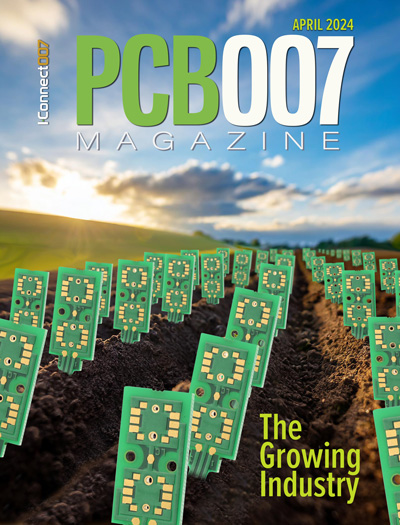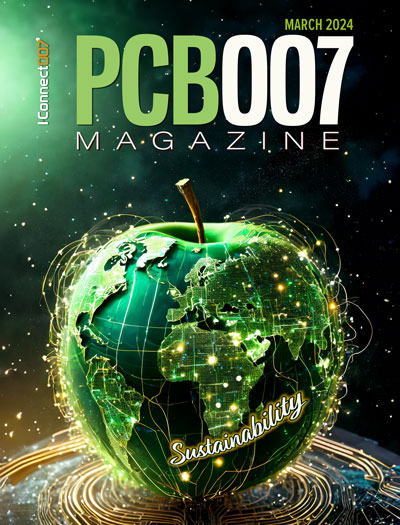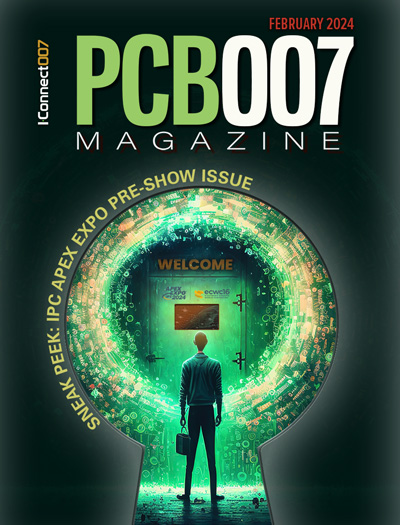-

- News
- Books
Featured Books
- pcb007 Magazine
Latest Issues
Current Issue
The Growing Industry
In this issue of PCB007 Magazine, we talk with leading economic experts, advocacy specialists in Washington, D.C., and PCB company leadership to get a well-rounded picture of what’s happening in the industry today. Don’t miss it.

The Sustainability Issue
Sustainability is one of the most widely used terms in business today, especially for electronics and manufacturing but what does it mean to you? We explore the environmental, business, and economic impacts.

The Fabricator’s Guide to IPC APEX EXPO
This issue previews many of the important events taking place at this year's show and highlights some changes and opportunities. So, buckle up. We are counting down to IPC APEX EXPO 2024.
- Articles
- Columns
Search Console
- Links
- Events
||| MENU - pcb007 Magazine
Rex Rozario, Part 2: The Beat Goes on: New Developments at Exeter, the Music Scene, and China
March 15, 2016 | Barry Matties, I-Connect007Estimated reading time: 13 minutes
To read Part 1 of this exclusive I-Connect007 multi-part interview conducted recently with PCB industry icon Rex Rozario, click here.
In Part 2 of I-Connect007’s multi-part interview with PCB industry icon Rex Rozario, we continue to discover more about what has made Graphic PLC the company it is today. Rex explains the work they’re doing with Exeter University, Graphic’s success in China, and his own personal experience in the UK music scene.
Barry Matties: Rex, tell me about what’s going on at Exeter.
Rex Rozario: We have a unit at Exeter University, at the Innovation Center. We are working with the new science park, which is just about to be completed by the Exeter airport. We'll have a facility for flying in, and for trains. It's for our development work mainly, because knowledge transfer is the most important thing. A good example is if you take Boeing, they had the monopoly of flying all the planes. Then, of course, Europeans from UK, Germany, France and Spain got together and with knowledge transfer developed the Airbus. I believe that's what we can do. The Exeter University allows access to all the facilities of their engineering college.
They have the latest developments in technology and we have the firsthand knowledge and can help them develop things like we did with LDI. We had the fifth machine ever built in the world, and Graphic worked with Orbotech on the second one, before it was launched out to production. We have a very close relationship. I think the other advantage for us, as compared to other companies around the world, is that we have more approvals than any other world competitor for our product. We can quite easily claim that nobody does it any better than Graphic, because they haven't got all those approvals. That's where we are now.
In 2006 we went to China and formed a joint venture [JV] with Somacis, called Dongguan Somacis Graphic PCB Company Limited (DSG). The factory was officially opened by the local mayor and other dignitaries in July, 2007. Most guys said we must be crazy because the Americans had been there a long time. When we got there the big companies were all rolling out production, but we still went and took our technology in. At that time, China was actually importing advanced technology from Japan and Taiwan. Suddenly they had a whole home supply market. When we started at the worst recession, all our competitors and guys thought we must be crazy and wouldn’t get work.
You wouldn't believe it Barry, because we didn't know the banking system and how it works in China. We said if anybody wants to use us it's 50% with order and 50% on completion and collection. They said, "You'll never get any customers, it’s the worst recession." After the first month we had a 16-week delivery backlog, because local customers suddenly realized they were saving freight charges from Japan and Taiwan, import duty, so it was cheaper and Graphic was getting a better price.
Matties: The factory set up is beautiful.
Rozario: It was designed and purpose-built and can compare with any other factory in the world. I think that up to this point, my life has always been with printed circuits; I haven’t had any other proper job.
Matties: Well, let's back up just a minute, because earlier today you told me that you were in the music and band business scene with some very famous musicians.
Rozario: That was all in my early years here in England. I took drum instruction from a local music shop and my drum tutor was Jim Marshall. At that time he was just an ordinary guy, a shopkeeper. I used to go to his house on Sundays. For sound proofing he used egg packaging boxes. Later on I joined his son and daughter and we had a band. We were called the Flintstones. I was one of the Flintstones. No loincloth or anything like that, and we progressed.
Back then I was helping out anywhere I could get some cash at night clubs and there was a local chap who I got to know by helping him out and for a drink and a few bucks for being there. That was the Ealing Club, which is the famous Ealing Club that most of the super groups in the UK had played at or started in. With my business acumen and attitude back then, I thought, "I could do this." I talked to him and said, "I'm living near Richmond and there's a Richmond hotel. If I have a night there, will you supply me with bands and give me a hand in how to organize it." And he did. Then I got married and of course I had to technically give up clubbing and my band and so forth, with my family living miles away. So I gave up my Saturday night.
Well, during that period there used to be a group who came in there and used the facilities for practicing, and they took over my night when I left. I realized later on that they were the Rolling Stones. They made their first record at the premises. If you read their autobiography you can see that’s where they started. In fact, Rod Stewart was a visitor of the club and he was travelling on the tube back to London one night. He was in the same compartment as the Rolling Stone's manager, who thought that he looked like the type of guy who could be a pop star. That's how he started.
It’s fun to look back on all these things and fortunately my children are also into music. My eldest son is now a professor of American Studies at Smith College in Massachusetts. He still has a group, called Merchant Bankers, which is a London East Ender term. They're still playing the Cream-era type music of Eric Clapton. My youngest son is also very much involved with music. He's a music specialist working with Amazon and based in Berlin. My daughter is a broadcaster with Radio Exe in Devon, England, and manages the Van Susan’s band in London. I am a director and chairman of Radio Exe.
Page 1 of 3
Suggested Items
Saab Announces Plans for New Munitions Facility in U.S.
04/03/2024 | SaabSaab announced plans to build a new munitions facility in the U.S., continuing the company’s strong investment and growth domestically.
Arlon EMC Receives IPC-4101 QPL Recertification
03/20/2024 | Arlon Electronic MaterialsArlon Electronic Materials has successfully completed an intensive two-day recertification audit by IPC Validation Services that examined Arlon’s manufacturing processes and testing procedures to assure that they are in conformance to the requirements of IPC-4101E-WAM1, the Specification for Base Materials for Rigid and Multilayer Printed Boards.
Orbit International Electronics Group Reports Bookings for February 2024 in Excess of $2,000,000
03/14/2024 | Globe NewswireOrbit International Corp., an electronics manufacturer and software solution provider, announced that its Electronics Group (OEG) reported bookings for the month of February 2024 in excess of $2,000,000.
U.S. Space Force Awards Boeing WGS-12 Communications Satellite Production Contract
03/07/2024 | BoeingBoeing received a $439.6 million contract to build the 12th Wideband Global SATCOM (WGS) communications satellite for U.S. Space Force's Space Systems Command.
IPC Releases Newest List of Standards Updates, Revisions
02/20/2024 | IPCEach quarter, IPC releases a list of standards that are new or have been updated. To view a complete list of newly published standards and standards revisions, translations, proposed standards for ballot, final drafts for industry review, working drafts, and project approvals, visit ipc.org/status.


